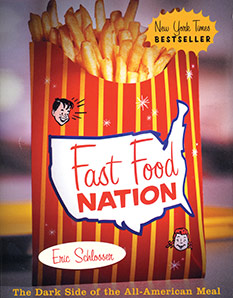Reading Between The Lines: Adaptation deviation: Food for thought: Take a bite of this
 CREDIT: HOUGHTON MIFFLIN
CREDIT: HOUGHTON MIFFLINA book that is both informative and entertaining that will leave readers hungry for more.
There’s plenty of literature disseminating the various corruptions and faults with the state of the world and how things are run, but a topic I’m particularly interested on is food criticism. No, not writing about whether the steak was medium-rare or just plain rare, but how what’s on our plates is raised, grown, packaged and deployed to our supermarkets for easy pickings.
Here are three entertaining and informative books on the state of this highly essential part of our lives. Be warned, however, that they do carry an agenda and that I recommend them as food for thought rather than hard facts – a springboard for further research of the topics discussed.
The Jungle (1906) by Upton Sinclair
The first of its kind – not by virtue of just being a tell-all sensationalist exposé – but as an examination of the foods that went in the mouths and stomachs of the average American, circa 1906. The novel is also, perhaps to a greater degree, a following narrative of the daily lives of the impoverished European immigrants that populated the floors of slaughterhouses, food canneries and packagers. Whichever angle you prefer, either way, The Jungle is not a book meant to be read while eating. Nothing is sacred from corruption at the hands of money-grabbing food barons. Even the milk, fed to babies and children, is tainted with formaldehyde preservation additives, while lard package and sold as premium quality is in reality made from scooped-up slaughterhouse run-off. As a historical piece, it will make you thankful that things are better today for both people and food. They have gotten better, right?
Fast Food Nation: The Dark Side of the All-American Meal (2001) by Eric Schlosser
Since its publishing nearly 14 years ago, Eric Schlosser’s spiritual follow-up to The Jungle has been re-released in newer editions, with updates and forewords to reflect changing times. However, despite changing attitudes and laws in reaction to the book and general controversy, the bottom line that our food comes often unsafely from environment- destroying farms after being harvested by impoverished immigrants is still very much intact. Fast Food Nation is an investigative look at food creation – from the food test labs to your supermarket shelf – the people responsible for creating the cheap and easy food behind the scenes and at the counter and of course a thorough history of various beloved fast food franchises.
Don’t Eat This Book! (2006) by Morgan Spurlock
Morgan Spurlock is either a genius effectively presenting important issues to a youth audience or a big fat liar. Regardless of how you see him, this companion book to his film Super Size Me does something different from Fast Food Nation; Don’t Eat This Book! examines the implications and impacts our current ease-of-access, single-serving culture has on humanity as a whole. Extensively cancelled school gym programs that lead to higher childhood obesity rates, increased rates of Type 2 diabetes, junk food leading to unruly kids; there’s plenty of stuff this book chews on.













